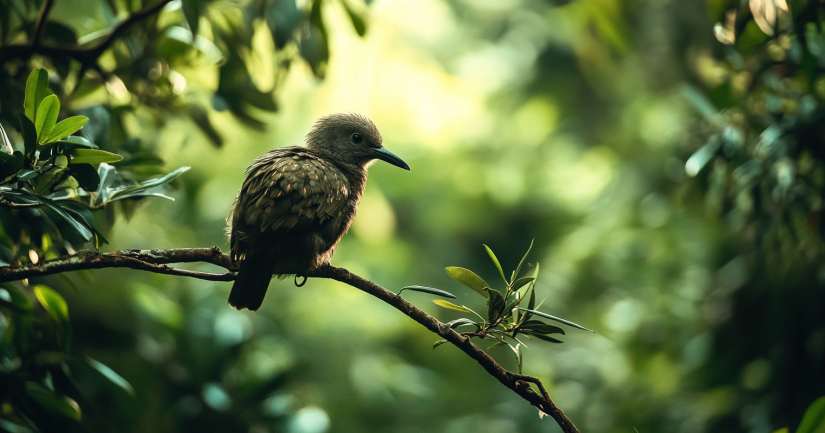
Are you ready to dive into the world of kiwis, here is our Kiwi Quiz – How Well Do You Know New Zealand’s Unique Flightless Bird? Kiwis are unlike any other bird in the world. This Kiwi Quiz will test your knowledge of these nocturnal, flightless birds that have become a national symbol of New Zealand. Despite their small size, kiwis have incredible adaptations, from powerful legs to highly developed senses. These fascinating creatures are part of a unique evolutionary story, thriving in forests and grasslands where few other birds could survive.
Kiwis belong to the Apterygidae family, making them distant relatives of ostriches and emus. However, unlike their larger flightless cousins, kiwis are small, round, and covered in soft, hair-like feathers that resemble fur more than traditional bird plumage. They have vestigial wings, meaning they cannot fly, but their strong legs make up for it. These legs account for about one-third of their body weight, allowing them to run quickly and dig efficiently in search of food.
Love learning about kiwis? Don’t stop here—take a deeper dive into the graceful world of the Goose Quiz or the flamingo’s rosy charm with the Flamingo Quiz.
Your Kiwi Quiz Starts Here – Are You Ready?
What Makes Kiwis Unique? Key Facts for the Kiwi Quiz
Another remarkable feature of kiwis is their long, slender beaks, which are unique among birds because their nostrils are located at the tip. This adaptation allows them to sniff out insects, worms, and small invertebrates hidden beneath the soil, making them one of the only birds that rely primarily on their sense of smell for hunting.
Where Do Kiwis Live? Understanding Their Habitat and Behavior
Kiwis are found only in New Zealand, where they inhabit dense forests, scrublands, and grasslands. As nocturnal birds, they are most active at night, foraging on the forest floor using their keen sense of smell and touch. Their whisker-like feathers around the beak help them navigate in the dark.
Unlike many other birds, kiwis prefer to walk rather than fly, using their powerful legs to cover surprising distances. They also dig extensive burrow systems, where they nest and hide from predators. These underground burrows provide safety, as kiwis are highly vulnerable due to their small size and lack of flight capabilities.
How Do Kiwis Reproduce? The Mystery of the Giant Egg
One of the most fascinating facts about kiwis is their egg size. A kiwi egg can be up to 20% of the mother’s body weight, making it the largest egg relative to body size of any bird in the world. This enormous egg contains a high amount of nutrients, giving the chick a head start in life.
Male kiwis take on the primary incubation duties, spending up to 80 days keeping the egg warm. Once hatched, kiwi chicks are self-sufficient, covered in feathers and able to find food without parental feeding. However, they remain vulnerable to predators, requiring safe burrows for protection in their early weeks of life.
Why Are Kiwis Endangered? Conservation Challenges and Efforts
Kiwis face significant threats due to habitat destruction, introduced predators, and human development. Before humans arrived in New Zealand, kiwis thrived in an environment with no natural mammalian predators. However, the introduction of stoats, cats, dogs, and rats has caused a severe decline in kiwi populations.
Today, conservationists work tirelessly to protect kiwi habitats, establish predator-free zones, and run breeding programs to increase numbers. Programs like Operation Nest Egg rescue kiwi eggs from the wild, incubate them in safety, and release the young birds once they are large enough to survive. Thanks to these efforts, some kiwi populations have begun to recover, offering hope for the species’ future.
Are You Ready to Take the Kiwi Quiz?
Now that you’ve explored the world of kiwis, it’s time to put your knowledge to the test! This Kiwi Quiz will challenge you with fascinating questions about their behavior, adaptations, and conservation. See how well you know one of New Zealand’s most extraordinary birds!
Check out our FULL collection of Bird Quizzes!
Kiwi – FAQ
A kiwi, often referred to as the Chinese gooseberry, is a small, brown, fuzzy fruit with vibrant green flesh and tiny black seeds. It is known for its unique sweet and tangy flavor. Kiwi is rich in vitamins C and K, dietary fiber, and antioxidants, making it a nutritious addition to various diets.
Kiwi offers numerous health benefits. Its high vitamin C content supports the immune system, while dietary fiber aids in digestion and promotes gut health. Additionally, the antioxidants found in kiwi may help reduce oxidative stress and inflammation, contributing to overall well-being.
There are countless ways to enjoy kiwi! You can eat it fresh as a snack, add it to smoothies for a nutrient boost, or use it in fruit salads. Kiwi also pairs well with yogurt, oatmeal, and desserts. For a unique twist, consider using it as a topping for savory dishes like grilled chicken or seafood.
While kiwi is generally safe for most people, some individuals may experience allergic reactions, such as itching or swelling in the mouth. Additionally, excessive consumption may lead to digestive discomfort due to its high fiber content. Moderation is key to enjoying the benefits without adverse effects.
To keep kiwi fresh, store them at room temperature until they ripen. Once ripe, you can refrigerate kiwi to extend its shelf life. It’s best to consume them within a week for optimal flavor and texture. If you have cut kiwi, store it in an airtight container in the fridge to prevent browning.
